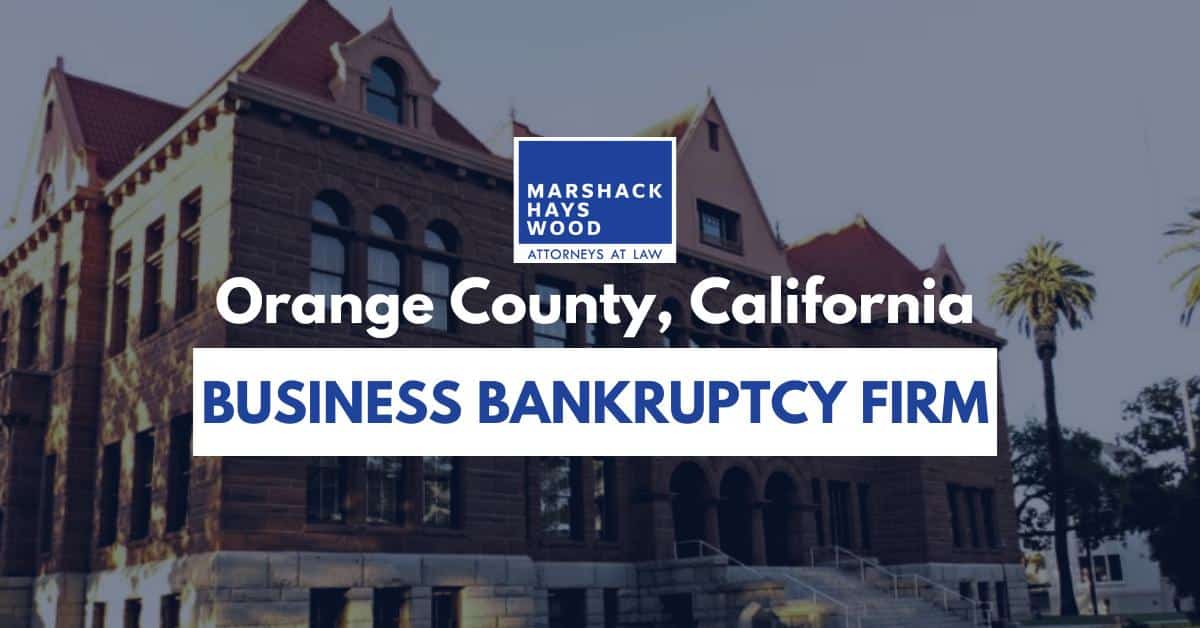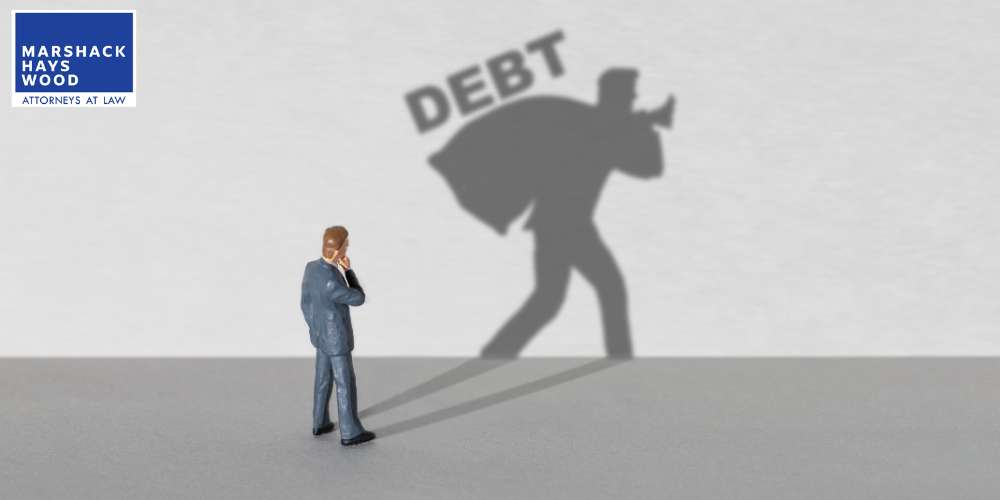Orange County Business Bankruptcy Attorneys
Home » Practice Areas » Orange County Bankruptcy » Business Bankruptcy
Practice Areas
Experienced Business Bankruptcy Law Firm in Orange County, CA

If your business is burdened by overwhelming debt, you may feel like there’s no way out. Constant creditor calls and mounting financial pressure can make it difficult to focus on keeping your company running. Fortunately, bankruptcy offers a legal path to stop creditor harassment, reduce or eliminate debt, and provide the relief you need. Speaking with Orange County business bankruptcy attorneys as soon as possible can help you understand your options.
At Marshack Hays Wood LLP, we help businesses of all sizes reorganize and repair their finances through bankruptcy relief. Call (949) 333-7777 or reach out online to schedule a free consultation with an experienced Orange County bankruptcy attorney at our firm today.
Is Bankruptcy a Good Option for Struggling Businesses?
When your company has too much debt and needs immediate protection from collection pressures, bankruptcy can be a practical reset. The many different chapters of bankruptcy give businesses options to stop creditor lawsuits, stabilize cash flow, and restructure obligations through a court-supervised payment plan.
At Marshack Hays Wood, our Orange County bankruptcy lawyers help small and large businesses alike preserve operations while liabilities are addressed. This includes evaluating your finances, explaining the bankruptcy process in plain terms, and crafting a strategy aligned with your goals so you can move forward.

Individual vs. Business Bankruptcy
Business bankruptcy differs from bankruptcies involving only personal finances, but the processes are similar. The main goal of bankruptcy for businesses is to help resolve businesses’ financial issues through liquidation or reorganization of their finances.
Generally speaking, if a business decides to file a bankruptcy petition, it will file under one of three chapters. These are Chapter 7, Chapter 11, and Chapter 13. The chapter you should file depends on the type of business you have and the specifics of your situation.
Chapter 7 Bankruptcy for Businesses in California
Unfortunately, many small businesses struggle to stay afloat for a full year, let alone five or ten years. If a business acquires overwhelming business debts, this may mean the business doesn’t have a viable future. In this case, Chapter 7 bankruptcy is often the best choice.
Also known as liquidation bankruptcy, Chapter 7 could benefit a limited liability company, sole proprietorship, or general partnership. It can also benefit businesses that don’t have a considerable amount of assets. This is what leads some business owners to choose Chapter 7, as a Chapter 13 reorganization would make less sense.
However, as with personal debt bankruptcies, businesses must pass a means test to file Chapter 7. The Chapter 7 means test determines whether the business’s income exceeds a certain amount. If so, that business cannot file Chapter 7. If the business’s income does not exceed the predetermined amount, it may file and benefit from Chapter 7.
After the Chapter 7 case begins, the bankruptcy court appoints a Chapter 7 trustee to take control of the business’s assets. These assets will be distributed to the creditors (liquidated). Once the assets have been distributed, the trustee will be paid for their role in the case. Sole proprietorships will receive a bankruptcy discharge, while partnerships and corporations will not. To learn more, reach out to an Orange County Chapter 7 bankruptcy lawyer at Marshack Hays Wood today.
Chapter 11 Bankruptcy for Businesses in California
For businesses that have a chance to continue their operations, Chapter 11 bankruptcy is often a better option. In most cases, corporations and partnerships will file Chapter 11, while sole proprietorships will file Chapter 7. However, many sole proprietorships use it when they cannot pass the means test to file Chapter 7.
In Chapter 11 bankruptcy, the company reorganizes its finances and remains in business under the supervision of a Chapter 13 trustee. The company proposes a reorganization plan on how it intends to handle its creditors. The plan may include actions such as recovering assets, terminating contracts or leases, and repaying a portion of the debt while discharging the rest to become profitable again. Creditors will then vote on the company’s plan. If those creditors and the bankruptcy court deem the plan to be fair and reasonable, the plan is approved. Then, the plan proceeds as proposed.
Chapter 11 cases are very complicated, and many do not succeed because of minor mistakes. In fact, it often takes a year or longer for a company’s reorganization plan to be approved. Working with a skilled Orange County Chapter 11 bankruptcy attorney can give you the support and insight you need for smooth sailing through your bankruptcy case.
Subchapter V of Chapter 11
As of August 2019, the Small Business Reorganization Act gives filers another option for filing under Chapter 11.
Subchapter V is a streamlined form of Chapter 11 designed for small business debtors within statutory limits. It reduces costs, speeds up plan confirmation, and keeps owners more involved in the process. It also does not require the appointment of a committee of creditors, nor does it require those creditors to approve the court plan.
Depending on the specifics of your case, Subchapter V may or may not be beneficial over filing for regular Chapter 11. Of course, we highly recommend speaking personally with a business bankruptcy attorney to determine which is the best course of action for you.
Chapter 13 Bankruptcy for Businesses in California
Most Chapter 13 bankruptcy cases are reserved for individuals, but sole proprietorships may also file under Chapter 13. This is possible because sole proprietorships are essentially extensions of their owners, making them indistinguishable. One might pursue small business bankruptcy under Chapter 13 if their goal is reorganization. It’s also important to note that during the Chapter 13 process, the sole proprietorship can remain in business.
In this case, you would file a plan for reorganization with the proper bankruptcy court that outlines how you intend to repay your debts to your creditors. Depending on income, assets, property, and total debt, the amount you are required to repay can differ. Chapter 13 is an especially popular option for sole proprietors whose personal assets are intermingled with their business assets. It is also popular for its ability to stop foreclosure, which may not be an option under Chapter 7.
Think this might be the right chapter for you? Call an experienced California Chapter 13 bankruptcy lawyer at our firm to discuss and identify your best options moving forward.

Business Bankruptcy Exemptions in California
Both the federal government and individual states have specific bankruptcy exemptions that they allow. Some states allow filers to choose which set of exemptions to use, but others do not. California bankruptcy law has a set of unique bankruptcy exemptions, but you must meet certain criteria to file and use these exemptions.
For example, in order to file bankruptcy in California, you must live in the state for at least 180 days. However, to use California bankruptcy exemptions, you must live in the state for at least 730 days before filing. If someone has not lived in the state that long, they must use their previous state’s exemptions.
California offers two exemption systems: System 1 (Code of Civil Procedure 704) and System 2 (Code of Civil Procedure 703.140). Filers with significant home equity usually prefer System 1. Those with little home equity often choose System 2 for its wildcard exemption.
If you are married and filing jointly, both spouses must use the same system. In general, you cannot double exemption amounts, with limited exceptions.
California Bankruptcy 704 Exemptions (System 1)
Here’s a breakdown of California’s System 1 (CCP §704) exemptions and where they help struggling businesses:
- Homestead Exemption (Primary Residence): Protects a large amount of home equity. For 2025, the protected equity ranges from $361,076 up to $722,507, depending on local home values. This is the main reason homeowners pick System 1.
- Motor Vehicle Exemption: Exempts equity in one or more vehicles up to $8,625.
- Tools of the Trade: Protects the equipment you use to earn a living, including one commercial vehicle. Limits are $10,950 per debtor, or $21,900 if spouses share the same trade. The commercial vehicle portion is capped within those totals.
- Deposit Accounts: An automatic bank account protection of $2,244 per debtor (as of July 1, 2025), plus separate protections for directly-deposited Social Security or public benefits.
- Wages and Accrued Leave: Up to $8,625 in unpaid wages, vacation, sick, or family leave.
- Jewelry, Heirlooms, Art: Up to $10,950.
- Life Insurance Loan Value: Up to $17,525; certain proceeds can be protected as needed for support.
California Bankruptcy 703 Exemptions (System 2)
Here’s a breakdown of California’s System 1 (CCP §703.140) exemptions and where they help struggling businesses:
- Homestead/Burial Exemption: Protects equity in a residence (real or personal property used as a home) up to $36,750.
- Motor Vehicle Exemption: Exempts equity up to $8,625.
- Household Goods: Up to $925 per item for clothing, furniture, appliances, books, instruments, and similar items.
- Jewelry: Up to $2,175.
- Personal Injury Recoveries: Up to $36,750 (as needed for support).
- Wages and Accrued Leave: Up to $8,625 in unpaid wages, vacation, sick, or family leave.
- Tools of the Trade: Up to $10,950 in tools, equipment, and professional books.
- Retirement: Tax-exempt retirement accounts, IRAs/Roth IRAs, and certain ERISA-qualified benefits (as needed for support).
- Life Insurance Loan Value: Up to $19,625 (unmatured policy values).
- Wildcard Exemption: $1,950 that you can apply to any property plus any unused amount of the homestead exemption above. This flexibility is the hallmark of System 2 when home equity is low.

Steps for Filing Business Bankruptcy in Orange County, CA
Before taking any steps toward your business bankruptcy filing, we always recommend speaking with an experienced Orange County bankruptcy attorney at Marshack Hays Wood LLP about your situation. California bankruptcy cases are very complex, and even a small mistake could derail your case.
Once you have determined which chapter will work best for you, you should gather all necessary documents and financial information from the past two years. You should carefully list your income, expenses, assets, and liabilities. One of our attorneys will help you with this part.
Then, your exemptions are determined, and you can officially file for bankruptcy.
Automatic Stay, Discharge, and the Next Steps of the Bankruptcy Process
Once the bankruptcy petition has been filed with the appropriate court, you immediately benefit from the protections of an automatic stay, which is a court order that can effectively:
- Stop Creditor Harassment
- Stop Collection Efforts
- Stop Wage Garnishment
- Stop Foreclosure
- Stop Reposessions
This gives you the breathing room you need to determine how to proceed. Depending on which chapter you file, your debts will either be discharged or reduced. An Orange County bankruptcy lawyer at our law firm will guide you through the entire process and ensure that everything is filed correctly the first time.

California Business Bankruptcy FAQs
Are You Personally Liable for Business Debts in Bankruptcy?
In general, unless you co-signed for the debt, you will not have any personal liability connected to that debt. The business is a separate legal entity from you, which means its debts are separate as well. There are some cases, however, when an individual could be personally liable for business debts. We recommend speaking with an attorney on our team about your business type and structure to help find your level of personal liability.
Do I Have to Close My Business if I File for Bankruptcy in California?
Not necessarily. Many companies continue operating in Chapter 11 or Subchapter V while reorganizing debt. Chapter 7 is a liquidation and is used when a going-forward business is not viable.
What Bankruptcy Chapter is Best for my California Business?
It depends on your goals and cash flow. Chapter 7 winds down a company that cannot continue. Chapter 11 or Subchapter V lets you stay open under a court-approved plan. Chapter 13 is only for individuals, not corporations or LLCs.
Can Owners Start a New Business After Filing for Bankruptcy?
Yes. In some cases, you can start a new business almost immediately. However, it most likely won’t be in your best interest. This is because bankruptcy damages your credit rating. A lower credit rating could lead to much higher interest rates. It is often a better option to take the time to rebuild your credit before starting another business.
Are There Alternatives to Business Bankruptcy in California?
Yes. Non-bankruptcy workout agreements, forbearance, secured party sales, assignments for the benefit of creditors, and receiverships may fit certain situations. Our legal team will assess these options alongside bankruptcy to choose the most practical path forward for you.

Why You Need an Experienced Orange County Bankruptcy Lawyer for Your Business Bankruptcy Filing
You are not legally required to hire an attorney for your bankruptcy case, but we strongly recommend doing so. As we mentioned before, California bankruptcies are very complex, so having experienced legal counsel on your side will only benefit and protect you. If your California business is in financial trouble, it is in your best interest to hire a lawyer before filing bankruptcy.
Working with a knowledgeable Orange County bankruptcy attorney gives you a clear plan for achieving debt relief and long-term financial freedom. Your attorney will review cash flow, contracts, and collateral, recommend the right chapter, and build a filing that protects assets and preserves money for your business operations.
Your legal counsel will also handle creditor communications and court deadlines, helping to avoid costly mistakes and unnecessary risk. When you work with an experienced legal team like ours at Marshack Hays Wood, you get practical guidance on exemptions, payment plans, tax issues, and trustee expectations in Southern California, so you can move through the process with confidence and focus on rebuilding your business.
Our Firm Can Help With Small Business, Commercial, & Corporate Bankruptcy
At Marshack Hays Wood, our business bankruptcy attorneys have considerable experience handling bankruptcy cases for businesses of all sizes. We proudly provide comprehensive legal assistance to small businesses as well as commercial and corporate clients across Orange County—including Irvine, Santa Ana, Newport Beach, Anaheim, and beyond—helping them pursue debt relief under the US Bankruptcy Code.
Our attorneys assess the situation, outline practical options, and file for bankruptcy when appropriate, guiding clients through each step to protect operations and value.

Call the Orange County, California Business Bankruptcy Lawyers at Marshack Hays Wood
Take the first step toward a fresh start. Call (949) 333-7777 or send a message online to schedule a free, confidential consultation with an Orange County business bankruptcy lawyer at our Irvine, CA law offices. We will review your goals, explain the process, and outline practical next steps so you can move forward with confidence.
READY TO GET STARTED?
At Marshack Hays Wood, our attorneys provide the legal support you need to move forward with confidence. Let us help you take the first step toward financial stability.
